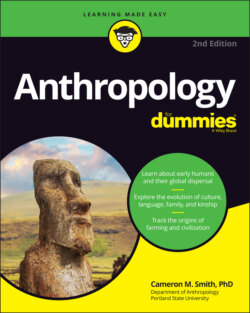Читать книгу Anthropology For Dummies - Cameron M. Smith - Страница 28
HARSH WORDS FOR EARLY ANTHROPOLOGY
ОглавлениеAlthough Europeans began to substantially colonize the New World and other “discoveries” in the 17th century, the colonialist endeavor wasn’t fully realized and backed up by industrialization until the 19th century. Early ethnographies — documents describing non-European cultures authored by people who lived for some time on those cultures — were often little more than intelligence reports for use in exploitation.
In 1966, Claude Levi-Strauss, a leading anthropologist of his time, wrote that cultural anthropology and ethnography were rooted in a historical context in which “… the larger part of mankind [was made] subservient to the other, and during which millions of innocent human beings have had their resources plundered and their institutions and beliefs destroyed, whilst they themselves were ruthlessly killed, thrown into bondage, and contaminated by diseases they were unable to resist.”
This kind of study is hardly surprising today, but keep in mind that for a long time, knowledge of what went on in non-Western cultures wasn’t based on direct experience but on superficial reports from outsiders. These reports often judged — with Western civilization’s basic biblical approach — what had been observed. This was a common error that took decades to overturn, so anthropology could understand each culture in its own unique context.
Colonialist ethnographies had some distinctive characteristics:
Racism: Particularly, the idea that non-Western people were inferior to Westerners and therefore had to be educated to the best of the colonial powers’ ability (but would always remain inferior to Westerners).
Social Darwinism: Particularly, the idea that non-Western people either were destined to be Westernized (in which case they should be helped to achieve Westernization — for example, by having their customs banned and replaced with Western customs) or were doomed to extinction (in which case not much could be done for them but to document them like living museum exhibits before they became extinct).
Ethnocentrism: The idea that Western civilization was at the pinnacle of human evolution, and that all other ways of life were inferior; note that this view isn’t exclusive to Western civilization — many cultures worldwide believe it as well.
Although early anthropology was colored by its involvement with colonialism, by the 1950s many anthropologists recognized that ethnographies being produced under the colonialist paradigm weren’t as objective as they could be, and they began to question the old concept of clear-cut races; in 1969, the American Anthropological Association formed a Committee on Ethics. By the mid-1970s, guidelines for ethical ethnography were being published, and today graduate students undergo ethical and human-relations training before doing fieldwork.
Federally funded anthropological research by U.S. researchers normally requires a review and approval by the government’s Institutional Review Board to ensure that “human subjects research” doesn’t harm the very people it’s researching.
Although anthropologists still must consider plenty of ethical issues when doing research among other human beings, I’m confident that most ethnographic anthropologists today don’t work for colonialist efforts or efforts counter to the interest of the people they study. In fact, my impression is that most ethnographers today do the opposite: They work in the interest of the folks they study. This approach can have its own pitfalls, if the researcher glorifies the people she’s studying, so remaining an impartial, scientific observer is a constant challenge. At the same time, most anthropologists — in one way or another — are working to answer some of the basic questions we looked at in the section “Getting to the Heart of Anthropology” earlier in this chapter.
